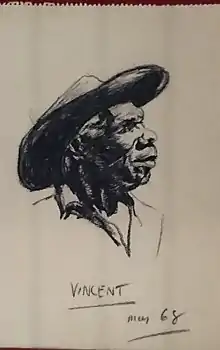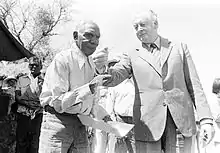Vincent Lingiari
Vincent Lingiari AM (13 June 1908 – 21 January 1988) was an Australian Aboriginal rights activist and member of the Gurindji people. In his early life he became a stockman at Wave Hill Station, where the Aboriginal workers were paid only in rations, tobacco and clothing. After the owners of the station refused to improve pay and working conditions at the cattle station and hand back some of Gurindji land, Lingiari was elected and became the leader of the workers in August 1966. He led his people in the Wave Hill walk-off, also known as the Gurindji strike.
On 7 June 1976, Lingiari was named a Member of the Order of Australia for his services to the Aboriginal people. The story of Lingiari is celebrated in the Paul Kelly and Kev Carmody song "From Little Things Big Things Grow".
Early life
Vincent Lingiari was born on 13 June 1908.[1][2] He became a poorly-remunerated stockman at Wave Hill Station when he was a young man.[3]
He also played the didgeridoo.
Wave Hill walk-off
Wave Hill Cattle Station is located approximately 600 km south of Darwin in the Northern Territory. From the late 19th century it was run by the British pastoral company Vesteys. Vesteys employed the local Indigenous people, the Gurindji, to work on Wave Hill. But working conditions were extremely poor and wages were very low when compared to those of non-Indigenous employees.[4]

In 1966, Lingiari, a member of the Gurindji, worked at Wave Hill and had recently returned from a period of hospitalisation in Darwin and led a walk-off of indigenous employees of Wave Hill as a protest against the work and conditions.[5] While there had been complaints from Indigenous employees about conditions on Wave Hill over many years, including an inquiry during the 1930s that was critical of Vestey's employment practices, the walk-off had a focus that was aimed at a wider target than Vestey's. Before 1968 it was illegal to pay an indigenous worker more than a specified amount in goods and money. In many cases, the government benefits for which Indigenous employees were eligible were paid into pastoral companies’ accounts, rather than to the individuals.[6]
The protesters established the Wattie Creek (Daguragu) camp and demanded the return of some of their traditional lands. Speaking on this Lingiari said, "We want to live on our land, our way".[7] So began the eight-year fight by the Gurindji people to obtain title to their land.
In 1969, Lingiari co-wrote the song "Gurindji Blues", with Ted Egan.[8][9]
Land rights act and handback

The Wave Hill strike would eventually reshape the agenda of relationships between Indigenous Australians and the wider community. Although initially an employee-rights action, it soon became a major federal issue when the Gurindji people demanded the return of their traditional lands.[6]
The strike lasted eight years. Over that time, support for Aboriginal land rights grew as the struggle intensified.[6] The protest eventually led to the Aboriginal Land Rights (Northern Territory) Act 1976. This act was the basis by which Aboriginal Australian and Torres Strait Islander people could apply for freehold title to traditional lands (known as Native title in Australia) in the Northern Territory and, significantly, the power to negotiate over mining and development on those lands, including what type of compensation they would like.[10]
An important and symbolic event in Australian history occurred when, during an emotional ceremony in 1975, Prime Minister Gough Whitlam poured the local sand into Lingiari's hands, symbolically handing a small part of land belonging to the Wave Hill station back to the Gurindji people, on a 30-year pastoral lease.[11][12][13] A photograph of the moment captured by Mervyn Bishop was purchased by the National Portrait Gallery and is displayed in Old Parliament House.[14]
On 7 June 1976, Lingiari was named a Member of the Order of Australia for his services to the Aboriginal people.[3]
Legacy
Lingiari died on 21 January 1988.[3] Every year until then he attended the Gurindji’s annual re-enactment of the walk-off.
Lingiari was a leader and holder of the cultural authority of the Gurindji people. His fight for his people's rights made him a national figure. He won a victory that is one of the most outstanding achievements in the history of the struggle for the recognition of Indigenous people, and brought awareness to non-Indigenous people of the deep connections between Aboriginal peoples and their land.[15]
One of Australia's largest electorates is named after Lingiari. The Division of Lingiari encompasses nearly all of the Northern Territory as well as Christmas Island and the Cocos Islands. It includes Daguragu and traditional Gurindji lands.[16]
The story of Lingiari is celebrated in the song "From Little Things Big Things Grow" written by Paul Kelly and Indigenous musician Kev Carmody and recorded by Kelly in 1991.[17] It was later added to the Sounds of Australia archive.[18]
The story of his part in the strike is also told in Irish folk musician Damien Dempsey's song "Wave Hill Walk Off", on his 2016 album No Force on Earth.[19][20]
See also
References
- Farrell, Adrian (25 October 2017). "Vincent Lingiari – Savvy Leader of the Wave Hill Station Walk-off". Can-Do Wisdom. Retrieved 13 August 2020.
- Egan, Ted (2012). "Lingiari, Vincent (1919–1988)". Australian Dictionary of Biography. 18. Melbourne University Press. ISSN 1833-7538. Retrieved 12 June 2016 – via National Centre of Biography, Australian National University.
- "Vincent Lingiari AM". Department of the Prime Minister and Cabinet. Retrieved 8 April 2012.
- "WAVE HILL". Tharunka. 14 (9). New South Wales, Australia. 2 July 1968. p. 14. Retrieved 7 January 2019 – via National Library of Australia.
- "Aborigines strike on NT station". The Canberra Times. 40 (11, 468). Australian Capital Territory, Australia. 27 August 1966. p. 1. Retrieved 7 January 2019 – via National Library of Australia.
- Linden Wilkinson (26 April 2016). Today We're Alive: Generating Performance in a Cross-Cultural Context, an Australian Experience. Cambridge Scholars Publishing. pp. 86–88. ISBN 978-1-4438-9279-7.
- "Vincent's victory". Deadly Vibe. August 2004.
- Singley, Blake (10 August 2016). "Song for the Gurindji". Australian Institute of Aboriginal and Torres Strait Islander Studies. Retrieved 11 August 2020.
- "'Gurindji Blues'". National Museum of Australia. 26 March 2020. Retrieved 11 August 2020.
- "Aboriginal Land Rights (Northern Territory) Act 1976 (Cth)". Documenting a Democracy. Museum of Australian Democracy. Retrieved 7 January 2019.
- "Fifty years since the Gurindji strike: Unions and the fight for land rights". Solidarity Online. 9 September 2016. Retrieved 9 August 2020.
- Lawford, Elliana; Zillman, Stephanie (18 August 2016). "Timeline: From Wave Hill protest to land handbacks". ABC News. Retrieved 9 August 2020.
- Shaw, M. (1 January 2005). "Whitlam's symbolic gesture set agenda". The Age.
- Kent, Ellen (June–August 2007). "A handful of sand". Portrait Magazine. National Portrait Gallery. Retrieved 19 August 2013.
- "Anniversary of Wave Hill land-rights walk-off". The Canberra Times. 65 (20, 592). Australian Capital Territory, Australia. 29 August 1991. p. 21. Retrieved 7 January 2019 – via National Library of Australia.
- "Profile of the electoral division of Lingiari (NT)". Australian Electoral Commission. Retrieved 7 January 2019.
- "Blood Brothers – From Little Things Big Things Grow". Australian Screen (National Film & Screen Archive). Retrieved 20 August 2008.
- "Sounds of Australia 2010". NFSA. Retrieved 7 August 2020.
- Gregory, Helen (7 March 2014). "Damien Dempsey: Dublin's working class act". Newcastle Herald. Retrieved 11 August 2020.
- Dempsey, Damien (17 April 2016). "Damien Dempsey - Wave Hill Walk Off" (Video). YouTube. Retrieved 11 August 2020.
External links
| Wikimedia Commons has media related to Vincent Lingiari. |